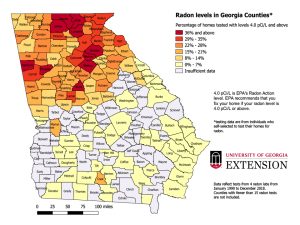Pamela Turner, UGA Extension Housing Specialist
Radon is an odorless, colorless gas that causes around 800 deaths in Georgia each year. Every January, the UGA Radon Program urges Georgians to test for the presence of radon gas in their homes.
As part of COVID-19 pandemic safety measures, many of us are spending more time at home. This makes it even more important that we test our homes for radon, the second leading cause of lung cancer and the leading cause of lung cancer among non-smokers.
Radon is a naturally occurring gas that comes from the breakdown of uranium in soil and rock. Granite rock often has high levels of uranium, which is part of why radon is such a persistent problem in Georgia. The gas seeps out of the soil and rises up into homes through crawlspaces, foundations, and basements.

Fortunately, testing for radon gas is simple and inexpensive. A short-term radon test is hung in the lowest level of the home for three to seven days, then mailed to the laboratory. Homeowners receive results after the lab processes the test kit. Tests can be purchased from the UGA Radon Program website (radon.uga.edu) or a hardware or big box store.
If the radon level in your home is high, you can install a radon reduction system. A radon reduction (or radon mitigation) system reduces high levels of indoor radon to acceptable levels. The system most frequently used is a vent pipe system and fan that pulls radon from beneath the house and vents it to the outside. Radon exposure from drinking water is primarily a concern in private wells. In Georgia, wells drilled into granitic crystalline rock aquifers, usually in the northern part of the state, are at risk of naturally occurring radon contamination. This is where the uranium that decays to radon can be found at higher levels. If you don’t know whether there is radon in your well water, have the water tested. The UGA Agricultural and Environmental Services Laboratories in Athens test water samples for the presence of radon. To get a water testing kit, contact your local UGA Extension office.